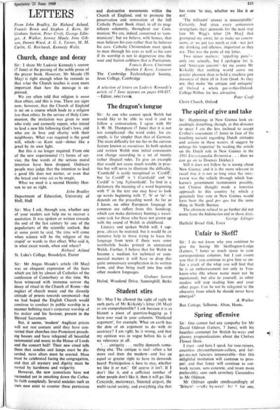The dragon's tongue
Sir: As one who cannot speak Welsh but would like to be able to read it and to follow a conversation, I agree with Mr J. W. M. Thompson (7 June) that it is not too complicated—the word order, for ex- ample, is far simpler than that of German. The main difficulty for me lies in the curious feature known as mutations. In both spoken and written Welsh nine initial consonants can change according to a set of twenty rather illogical rules. To give an example that would not cause much trouble in prac- tice but will serve to illustrate the difficulty, 'Caerdydd' is easily recognised as 'Cardiff', but `to Cardiff' is I Gaerdydd' and 'in Cardiff' is 'yng Nghaerdydd'. To find in a dictionary the meaning of a word beginning with 'f' in the text one may have to look up words beginning with 'f', 'b' or 'm'—it depends on the preceding word. As far as I know, no other European language in common use suffers from this handicap, which can make dictionary hunting a weari- some task for those who have not grown up with the sound of Welsh in childhood.
Literary and spoken Welsh will, I sup- pose, always be mutated, but it would be an immense help to those trying to learn the language from texts if there were some worthwhile books printed in unmutated Welsh. Further, I believe that for Welsh to become a medium for technical or com- mercial matters it will have to drop this quite unnecessary complication in its written form, and thus bring itself into line with other modern languages.
Graham Sutton Hafod, Woodend Drive, Sunninghill, Berks






































 Previous page
Previous page